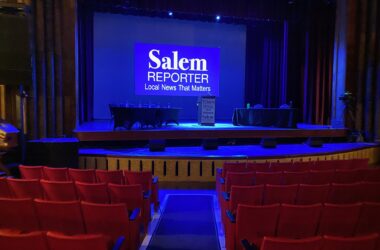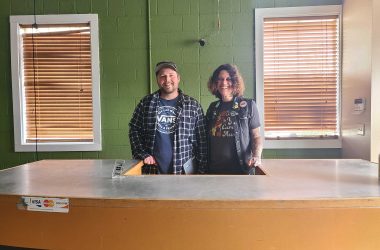What is a good death? John doesn’t know, but he said he wants to find out.
He asked a Salem group gathered over beers, one cocktail and a plate of tofu tacos split four ways whether they had any ideas.
Everyone at the meeting was in or near their 70s, and everyone has had death on their minds for a long time.
Dave MacMillan, the group’s organizer, said death was always a taboo subject in his family, and one rarely breached. He said his mother once mailed him a letter to let him know his childhood dog had died, even though he lived within driving distance of home.
“Why is our society so weird about death?” he said to the group.
John said he’s always been interested in death, since his mom died too young and two close friends died when he was in his 20s. Janice is trying to plan for her own death, has retirement homes on her mind and lives alone since her husband died over a decade ago. Jean has been thinking about it more lately because of a terminally ill friend.
Participants were gathered to talk about the inevitable. The meetings, called Death Cafes, aim to break taboos around the subject of death and dying, and to celebrate being alive.
The Salem group meets twice a month, not always with the same people. Half the meetings are virtual over Zoom, and the others are in person at the aptly named For Tomorrow We Die Brewing Company in southeast Salem.
Despite the macabre subject, the tone of the meeting is lighthearted and educational. Participants talked and sipped drinks under the moody lighting of the brewery’s back room which has skulls, dark pleather seating and an unoccupied golden throne, and muffled chatter and lively music from the bar encouraged them to speak loudly.
Group members asked Salem Reporter to identify them by first name only for privacy given the personal subject matter.
Dave MacMillan, the group’s organizer, showed up to Wednesday’s meeting on a motorcycle and wearing a shirt with skulls on it.
He first heard about Death Cafes eight years ago, after learning about a group out of Monmouth. Death Cafes began in London in 2011, when founder Jon Underwood wanted a place to normalize conversations around death over tea and cake.
After learning about the cafes, he and a friend planned to start one in Salem but never got around to it.
That friend had a good death, MacMillan told John.
MacMillan’s friend had ALS, a fatal disease that breaks down nerve cells and causes muscle decline. He lived life to the fullest up until his death, going to the movies using a wheelchair accessible van and taking a trip to ski in Europe with someone behind steering his chair down the hill.
He said his friend qualified for Oregon’s Death with Dignity Act that allows terminally ill people to voluntarily take lethal medications. The friend planned his death for the Thanksgiving holiday so he could be around family, and so his wife would have company and someone to cook and do yard work in the days afterward.
“He had a wonderful death,” MacMillan said, to agreement from the group. The idea of organizing posthumous help for loved ones was especially appealing to them.
It took MacMillan another five years after his friend died to start hosting Salem’s Death Cafe, along with a group of friends.
They first started meeting in the fall of 2019, at IKE Box Café, a funeral home turned coffee shop on Northeast Cottage Street. Early meetings had cake, in honor of the original London gatherings.
Covid soon brought the meetings online, and people still attend the Salem group from as far away as Australia. The pandemic brought death to the front of mind for many, and still loomed over Wednesday’s meeting. One regular couldn’t make it due to an exposure, and everyone else was already planning for their next booster shot in the fall.
MacMillan doesn’t have a script for the meetings, and tends to let the conversation go where the attendees want it to while he takes notes.
Often, people bring in readings and resources to add to a shared list that MacMillan updates. Wednesday’s meeting focused on their latest discoveries for ways to build community online.
Janice brought in a packet with information on how to sign up for CaringBridge, a nonprofit that helps families send updates about a terminally ill person’s condition, organize errands and receive messages.
“I’m alone and I don’t have family in the area. Communicating is important to me,” Janice said. John said he knew a young person with cancer who used it, and seconded Janice’s recommendation.
MacMillan shared the name of an app he’s been trying out called WeCroak. Five times a day he gets a reminder that he’s going to die at some point, followed by an inspirational quote. The group laughed, some taking note of the name to try it themselves and others lightly teasing him for it.
Jean has a former classmate back in the Midwest who will die soon. She had been nervous to reach out since they hadn’t spoken in years, but she eventually made the call. Despite her friend’s decline being visible through the screen, they spent hours reconnecting over a FaceTime that often dissolved into hysterical laughter.
Afterward, Jean said she spent a good four hours creating an electronic card on JibJab to make cartoon characters of her and her friends dance to “Love Shack” and “I Like to Move It.” She said it was a big hit the next time they talked.
Janice recently finished going through a lifetime of family photos. She mailed some to family, kept those most important to her, and threw away the rest. She brought a printed out photo she took of the stack of boxes to pass around the group.
When John asked why she didn’t digitize them, Janice was firm in her decision to go through them once and be done with it. She pictured herself with a box of them on the bedside table in a retirement home.
“It’s easier when you’re in decline to look in a box, and look through photos with your fingers,” she said.
Cremation, green burials and other body disposal methods are common discussion topics, MacMillan said. The group members want to make things easier on their loved ones after they pass, and organize what they can now.
“I think about my obituary sometimes,” Janice said. With nearly 20 jobs in several states during her lifetime, it would be too complicated for anyone else to do. “It’s been a wonderful trip, and a very exciting life, but I don’t know how to summarize it.”
After sharing resources, the group talked about what they’re doing to stay connected with the community and make the most of their current level of health.
Several are involved in the Institute of Continued Learning at Willamette University, which allows retired people over 50 to learn about a variety of subjects, and all sought out new book recommendations from each other.
Janice shared highlights from her multi-day trip with Center 50+ to wineries and a lavender farm, and Jean shared thoughts on a Patti Smith concert she went to in Portland the night before.
They’re making peace with death, but they aren’t dead yet.
“Cheers to being alive,” MacMillan said, and the group clinked glasses.
The Salem Death Cafe meets twice a month, virtually on the first Thursday of the month at 5:15 p.m. and in person each 3rd Wednesday of the month at For Tomorrow We Die Brewery, 2315 25th St. S.E. at varying times. Participation is free, and all ages are welcome.
For more information, see the Death Cafe’s Facebook page.
Contact reporter Abbey McDonald: [email protected] or 503-704-0355.
SUPPORT OUR WORK – We depend on subscribers for resources to report on Salem with care and depth, fairness and accuracy. Subscribe today to get our daily newsletters and more. Click I want to subscribe!

Abbey McDonald joined the Salem Reporter in 2022. She previously worked as the business reporter at The Astorian, where she covered labor issues, health care and social services. A University of Oregon grad, she has also reported for the Malheur Enterprise, The News-Review and Willamette Week.









